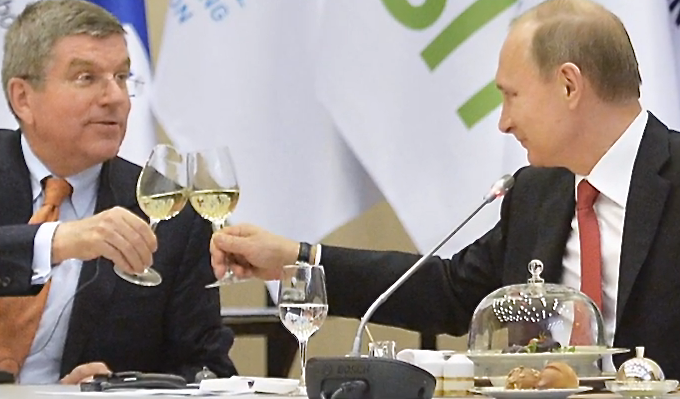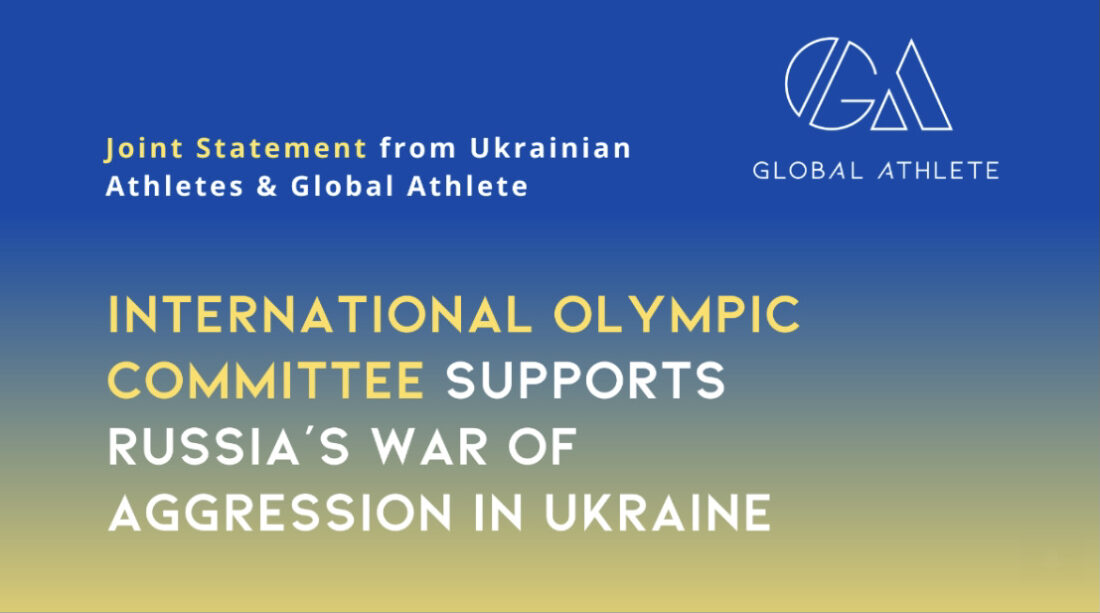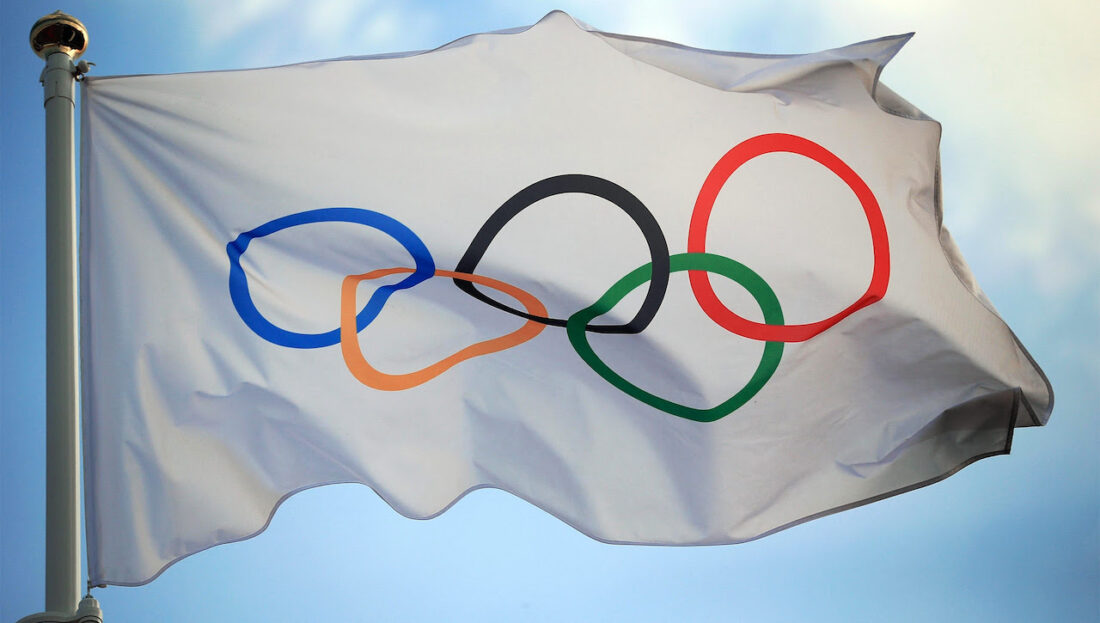Olympic Bosses Confirm Ban On Putin’s War Machine But Bypass Rulings On Nazi Germany, Imperial Japan & Apartheid To Give Russians A Ticket To Compete Against Ukrainians

The International Olympic Committee – IOC – has confirmed its ban on Russia and Belarus but has opted to stick to its decision not to exclude athletes from both nations in a move that sits at odds with Olympic bans on athletes from Nazi Germany, Imperial Japan after the Second World War and South Africa during the apartheid years.
There was a time when a whole-nation ban meant just that but not these days. International conventions are cited and rogue leaders with blood on their hands learn that sanctions come with pleasing compromise.
Russian warmonger Vladimir Putin, who was stripped of the Olympic Order for breaking the Olympic Truce as he waged war on Ukraine, has threatened the world with “consequences”, interpreted as extending to the risk of a third global war.
Neither that nor the objections of Ukrainians who have seen vast swathes of their country’s infrastructure, from energy to sports facilities, kindergartens, school and homes, devastated, has prevented the IOC, led by German Thomas Bach, from asking Russians and Belorussians to contribute to pressure on Putin to end his murderous campaign.
The IOC decision asks federations to provide Ukrainian athletes forced out of their homes and living in exile with training assistance and subsistence while their families remain in the war-torn homeland. At the same time, the IOC is also asking Ukrainians to welcome Russian athletes – who have not had training nor home life turned upside down nor family members killed nor watched their land being destroyed under Putin fire – back to competition.
The IOC has effectively put Ukrainian athletes in a position where they may feel they have no choice but to boycott events, namely the Paris 2024 Olympic Games. Such an outcome would join Swastikas at Berlin 1936 and other horrors of IOC history in the hall of Olympic shame.
If Ukrainians do show up alongside Russians, then there would be incitement to consider, as Mykhailo Romanchuk made very clear at the World Championships last summer in Budapest in the absence of Russians:
Athletes for Ukraine issued the following joint statement with Global Athlete, supported by the Belarus Sport Solidarity Federation Athletes, slamming the IOC decision:

Today’s decision to allow Russian and Belarusian athletes to compete in qualifiers to attend the 2024 Paris Olympic Games sends a message to the world that the International Olympic Committee (IOC) endorses Russia’s brutal war and invasion of Ukraine. By allowing Russian and Belarusian athletes to compete, the IOC is strengthening Russia’s propaganda machine, empowering the Putin regime, and undermining peace.
Russian officials have consistently and publicly promoted their athletes’ involvement in the war. Russian National Olympic Committee President Stanislav Pozdnyakov blatantly stated that “the country’s athletes should be honoured to fight in the war of Ukraine.” This mindset has been longstanding as Russia has proven time and time again that athletes are an integral part of its foreign policy. Athletes have consistently been elevated to high-ranking military positions and used in state propaganda.
The return of Russian and Belarusian athletes to international competition, especially the 2024 Paris Olympic Games, will see the Russian state use athletes once more to bolster the war effort and distract from the atrocities in Ukraine on one of the biggest multi-sport stages in the world. We’ve seen the IOC include Russia as ‘neutral athletes’ before, only to be rebranded as Olympic Athletes of Russia (OAR). This decision compels the other 204 nations attending the Games to stand with and compete against an army of athletes forced to endorse Russia’s invasion of Ukraine.
The IOC claims that fairness requires that no athlete be punished for the actions of their government. This position ignores the reality of international sport as a tool of geopolitics – the Russian Olympic Team is part of the Russian state and Russian athletes are not politically free. Every Russian athlete competing in Paris has the potential to incite further lives lost in Ukraine.
It is becoming increasingly clear that Russia has complete control over the IOC and its leadership. The IOC is allowing the Games to be used for sportwashing – to normalize, legitimize, and distract from the war. As a servant of Russia, the IOC continues to be on the wrong side of history with this decision that favours politics over principle and war over peace.
As we have stated before, we recognize that the IOC cannot stop the violence. However, we do know that as leaders of sport, the IOC stands in a powerful position to prevent Russia from continuing to use athletes and sport as a tool of foreign policy. The IOC has the responsibility to enact its Olympic Charter and Strategic Framework on Human Rights, which states that “the goal of Olympism is to place sport at the service of the harmonious development of humankind with a view to promoting a peaceful society concerned with the preservation of human dignity.” Today’s decision contradicts the IOC Charter and their Human Rights Framework.
The suspension of both Russian and Belarusian athletes and their sporting officials must be fully reinstated until Russia withdraws completely from Ukraine. We acknowledge that reinstating the ban will pain many Russian and Belarusian athletes and will deny them an opportunity to pursue their careers on the world stage. We recognize that athletes are not the powerbrokers who are responsible for this war. Our call today is a hard stance with a real human cost. However, the cost on Russian and Belarusian athletes pales in comparison to the atrocities experienced by every single Ukrainian.
We invite athletes of the world to join and support Ukrainian athletes in their call for the IOC to fully ban Russia and Belarus from the 2024 Paris Olympic Games. Athletes can sign on to this letter by emailing hello@globalathlete.org. By standing together, athletes can force the IOC to stand up for human rights and peace.
Signed on behalf of:
Athletes for Ukraine
Global Athlete
Supported by:
Belarus Sport Solidarity Federation Athletes
The Olympic Committee Statement In Full:
The Executive Board (EB) of the International Olympic Committee (IOC) met today to consider the unanimous conclusions of the Olympic Summit (9 December 2022), which comprises the leaders of all the stakeholder groups of the Olympic Movement and the International Paralympic Committee (IPC). Following this Summit, consultation calls were held with the IOC Members, the global network of athletes’ representatives, the International Federations (IFs) and the National Olympic Committees (NOCs) on 17 and 19 January 2023.

The discussions had three parts: first, the sanctions against the Russian and Belarusian State and Government; second, the solidarity of the Olympic Movement with the Ukrainian athletes and the Ukrainian Olympic community; third, the possible access to sports competitions for individual athletes with Russian or Belarusian passports.
1. With regard to the sanctions, participants in each of the consultation calls unanimously reaffirmed and called for a reinforcement of the sanctions already in place:
- No international sports events being organised or supported by an IF or NOC in Russia or Belarus.
- No flag, anthem, colours or any other identifications whatsoever of these countries being displayed at any sports event or meeting, including the entire venue.
- No Russian and Belarusian Government or State official should be invited to or accredited for any international sports event or meeting.
2. With regard to the solidarity with Ukrainian athletes and the Ukrainian Olympic community, there was also unanimous support to:
- Continue and even strengthen the full and unwavering commitment to solidarity with the Ukrainian athletes and the Ukrainian Olympic community in order to have a strong team from the NOC of Ukraine at the Olympic Games Paris 2024 and the Olympic Winter Games Milano Cortina 2026.
- Encourage all IFs, NOCs and sports event organisers to undertake all possible efforts to facilitate the training, preparation and participation of Ukrainian athletes in international sports events.
3. With regard to the individual athletes with Russian or Belarusian passports, the vast majority of the participants in each of the consultation calls expressed the following:
- Strong commitment to the unifying mission of the Olympic Movement, requesting and encouraging it to live up to this unifying mission, particularly in these times of division, confrontation and war.
- Respect the rights of all athletes to be treated without any discrimination, in accordance with the Olympic Charter. Governments must not decide which athletes can participate in which competition and which athletes cannot.
- No athlete should be prevented from competing just because of their passport.
- A pathway for athletes’ participation in competition under strict conditions should therefore be further explored.
- Such strict conditions being:
- In the event of any athlete failing to respect the eligibility criteria or failing to respect the strict participation conditions as set out above, the IF and/or the sports event organiser concerned should immediately remove them from the competition, suspend them from further competitions and report the incident to the IOC for its consideration for further measures and sanctions.
- Welcomed and appreciated the offer from the Olympic Council of Asia to give these athletes access to Asian competitions.
The vast majority in each of the consultation meetings requested the IOC to continue the exploration of the above-mentioned concept by way of bilateral consultation, with each International Federation being the sole authority for its international competitions.
The participants’ deliberations were informed by a number of documents, including but not limited to the following:
1. A letter from the Special Rapporteur in the field of cultural rights and the Special Rapporteur on contemporary forms of racism, racial discrimination, xenophobia and related intolerance of the United Nations Human Rights Council.
- The letter from the Special Rapporteurs states: “We express serious concern, however, about the recommendation to ban Russian and Belarusian athletes and officials such as judges from international competitions, based solely on their nationality, as a matter of principle. This raises serious issues of non-discrimination.”
2. The UN General Assembly resolution A/77/L.28: “Sport as an enabler of sustainable development” adopted by consensus by all UN Member States on 1 December 2022, including Ukraine, Russia and Belarus.
- The Resolution recognised that major international sports events “should be organised in the spirit of peace” and that “the unifying and conciliative nature of such events should be respected”.
- It also supported the political neutrality of the Olympic Movement and “the independence and autonomy of sport as well as the mission of the International Olympic Committee in leading the Olympic Movement”.
- Opening the debate in the UN General Assembly, the President of the 77th Session of the UNGA said: “I encourage all Member States to preserve the unifying spirit of sports and the Olympic Movement. It is far more promising to the world if nations compete on the fields of sports than on the battle fields. The former makes us more noble and stronger, the latter leaves death and devastation behind.”
3. Reference was made to the situation regarding the participation of individual athletes from the former Yugoslavia at the Olympic Games Barcelona 1992.
- At the time – contrary to the situation today – there were United Nations sanctions in place against the Federal Republic of Yugoslavia, calling on all Member States to: “Take the necessary steps to prevent the participation in sporting events on their territory of persons or groups representing the Federal Republic of Yugoslavia.”However, even under this UN sanction regime, the participation of “independent athletes” was allowed at the Olympic Games Barcelona 1992.